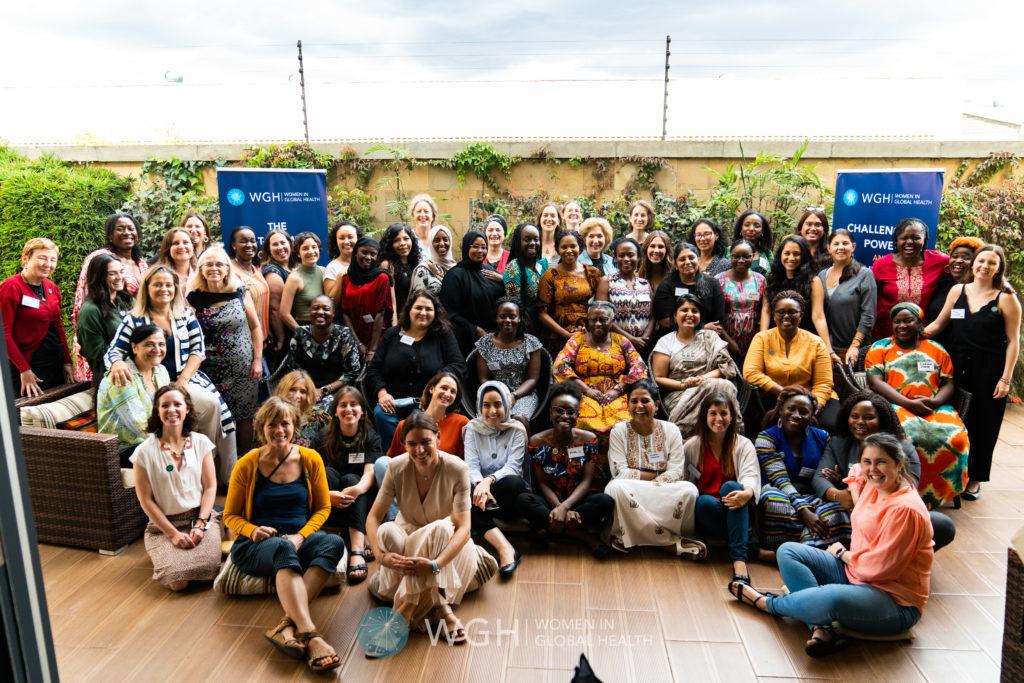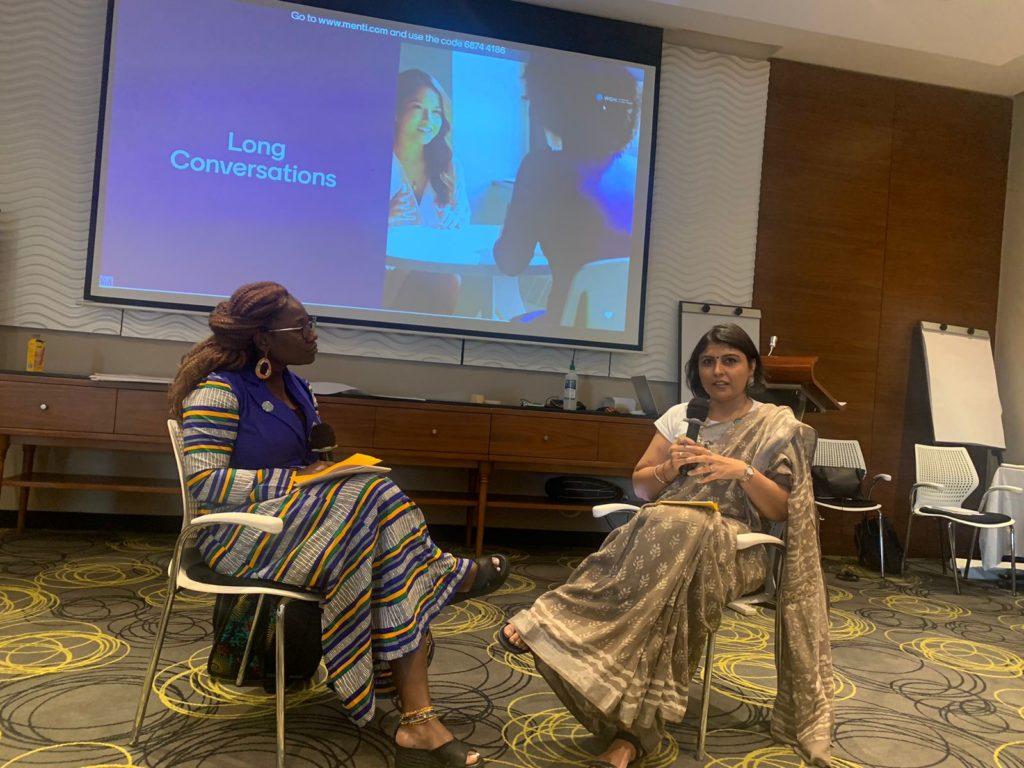
Travelling “out of India” for an in-person workshop for the first time in almost three years, I landed in Nairobi with anxiety and a ton of self-doubt on how I would engage with the participants of the Women in Global Health (WGH) Peer-to-Peer workshop (24-27th Sept). I had almost forgotten to be “in that zone”, not being an extrovert (read ‘talkative but introverted’ if that makes sense) in the first place. But, to my surprise, Nairobi and the Women in Global Health team greeted us with so much love and warmth, that it automatically resulted in organic connections.
This was the first time in the history of the Women in Global Health journey, that the chapter leaders were brought together for deliberations, reflections and training to (further) build the WGH movement in different parts of the world. With the first and last days of the workshop focused on Chapter Development, the second day dedicated to Gender Transformative Leadership (GTL) and the third day to Research and Advocacy, the workshop was meticulously designed and conducted, using the participatory-based approach, and showcasing ‘learning by sharing’ in its true sense. The discussions on GTL were particularly interesting. While most of us were hoping to begin the day with a definition or a framework of GTL, that we could then use to reflect upon and apply in our country contexts, instead, the morning began with a reflective exercise on identifying the core values we believed in, why and the behaviors driven by these values. This was then followed by discussions and reflections on the process to achieve the desired outcomes of GTL, through knowledge generation, identifying and leveraging mechanisms, identifying the enablers and barriers within our (professional and personal) environment that push or restrict us in driving change, and sharing of examples from different countries on how they have managed to bring change(s) at policy and decision-making levels. It was these discussions that made us feel empowered, that we *are* indeed Gender Transformative Leaders in our respective spaces and in many forms. GTL cannot be defined for us by someone, we have to define it for ourselves in ways relevant to our country contexts. Each and every person engaged in organizing and participating in this workshop has an inspiring journey of their own, and there is so much to learn from their experiences in professional as well as in personal lives.
Below I share some of my personal reflections and “epiphanies” I take home from this visit to Nairobi 😊.
As a public health researcher, my interest in gender (challenges) has been primarily driven by my own experiences and reflections over the past two decades, but mainly recently, when I started understanding and unpacking different (often intertwined) layers of societal structures and barriers that drive the stereotypical behaviors and expectations from women and people of other genders. I always felt that the lack of a proper training in gender studies and allied areas makes me somewhat less of an ‘expert’ in this area than my peers. This workshop, however, reminded me of the fact that my personal experiences and reflections make me who I am, and I should leverage these to drive change in the spaces of my influence.
I had another epiphany on the very first night of the Workshop, when the funders and partners from Nairobi joined us for dinner. Honestly, looking at so many new faces, beyond WGH chapter leaders, it was then that the real anxiety kicked in, on how to engage. “I cannot let this opportunity go to waste”, “the Chapter and my team have entrusted me with responsibility, I cannot fail them”, etc. With these thoughts in mind, I gave myself “a challenge”: to talk to just three new people that night! And lo and behold, I managed to overcome my shyness, walking up to people introducing myself like, “Hi, I am Deepika Saluja, from WGH India, I am attending such an in-person meeting after three years, I am feeling a bit shy and anxious on how to engage”. To my surprise, this turned out to be a great conversation starter. I connected with nearly a dozen people that night and exchanged business cards with ~half of them. So, the lesson of the night was for me: spell out honestly how are you feeling and that, somewhat magically, will help you kick off the conversation 😊.
After exploring and experimenting with my career trajectory, I consciously chose to be in the space of public health research, as it makes me stay grounded to the realities. However, disappointed by the limited impact research can have sometimes (depending on networks but partly also luck), the conversations at the workshop also made me realize the potential of teaching in influencing young minds, moreover at a relatively larger scale. As a faculty staff member or professor, we indeed have the opportunity to instill the values of ethics, equity, social justice and human rights through our teaching early in their journeys. Eventually, this will then get reflected in the critical decisions they will be taking in the health and development sector, in times to come.
Linked to the above are also some of the challenges young leaders face, however. Leadership is often seen or understood as senior leadership with years of experience, managing big projects and organizations, and being engaged in key decision-making spaces. Young (especially female) leaders are often not well-accepted nor trusted with much responsibility in many spaces within the global health community, and they continue to face numerous challenges. I raised this as an important issue in the long conversation I had on Day 2 while sharing my journey as a Chapter leader, on the need to support young leaders in managing their work and teams effectively, while not letting them compromise on their ambitions and work-life balance, and get exhausted and disappointed in the process. WGH is one such fantastic example where we see young leaders running the movement in their specific countries, EV4GH is another example that supports and capacitates young researchers and practitioners to challenge the status quo. But so much more needs to be done in this space, in terms of investment, capacity building, mentorship, and most importantly receptiveness of the global health community for young leaders to really transform the way in which the world is currently operating.

Being an over-sensitive person and rebellious at the same time, I had been draining myself by responding to every comment, taunt, and poke coming my way. It was my chat with Dr Magda Robalo, Global Managing Director, WGH, during one of the dinners, that helped me understand though, that ‘we cannot fight every fight and win’. It is important for us to carefully chose our battles and be strategic in leveraging our positions to drive the change, be it in our personal or professional spaces. (My husband has been trying to make me understand this for more than a year now, but somehow it took a trip to Nairobi and meeting with Dr Robalo to truly realize this – he is indeed happy with this “epiphany” in particular).
This much needed trip to Nairobi not only revived my confidence, but also opened up a zillion conversations to follow up for building (further) the India Chapter, building the gender equity movement, and most importantly, building each other as sisters and allies. I took back from Nairobi, a heart filled with love and warmth and celebrating each other, a reaffirmation of my capacities, and the reignited passion to change the world. It is indeed possible, and I will change it one day, sooner than later 😊.